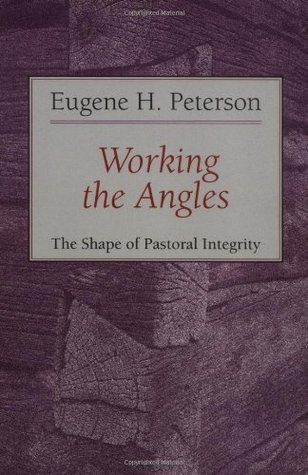Eugene H. Peterson looms giant on the landscape of modern American Christianity. He is a Presbyterian pastor, but also the author of several well-known books and the man behind The Message (a hugely popular paraphrase of the Bible). Peterson is the man every evangelical author wishes to be: successful, deep, respected (and probably wealthy). I’ve come across Peterson’s work in bits and pieces, always awed at even the elegance of his subtitles, but never delving into a full-length work before this, Working the Angles. It had all the trappings of a good book: an interesting topic, brief in length, written by a famous author, even touting praises from two other famous authors on the back cover. Plus, it was a book on the spiritual tasks of pastoring; I was ready to spend the next 131 pages amen-ing what I was sure Peterson would say: that pastors must firstly be spiritual if ever they hope to be spiritual leaders.
I wasn’t altogether wrong. Nor was I completely right. Peterson does emphasize the fundamental spiritual acts of pastoring: prayer, reading Scripture, and giving spiritual direction. He likens these to the three requisite angles of a triangle. While circumstances, personality, and history may differ and give triangles different sizes and proportions, without the angles there is no triangle. Similarly, he argues, without prayer and Scripture reading and spiritual direction there is no true pastoral ministry and all the effort and all the thought fizzles down into mere shopkeeping. All of this I expected. There were two ways, however, that Peterson surprised me; one, in an act of commission, and the other in an act of omission.
First, Peterson does more than exhort me as the reader by rephrasing the books I’ve already read or by re-arranging the convictions I already have. With a winning eloquence, he not only re-packages ancient ideas into stunning and fresh works of art, he comes very close to developing a theology of prayer and a philosophy of Scripture reading. Peterson is not content to say that the Psalms are a good place to begin praying Scripture, but he guides our blind hands across the contours of the Psalter, pointing out its unique textures and curves. And Peterson gives Scripture reading, one of the most basic acts of the Christian life, an astounding theological and philosophical treatment, wading through the basic concepts of word and thought and book, playing in the deeper waters of the oral-aural history of the Word of God, and diving into the notion of contemplative exegesis.
Second, Peterson leaves out something very important from his work. If you were to come to my house and step into my study and peruse my bookcase, you would see shelf after shelf filled with technique and methodology: how to understand prophecy, how to visit parishioners, how to preach so people will listen, how to parse a Hebrew verb, how to give Bible studies. The more years I add to my theological training, the more how-to books congest my shelves, each one apparently indispensable for good pastoral ministry. Peterson’s book, however, is distinctly different. There is much on what and why, but very little on how.
With a lively vocabulary and richly visual style, Peterson diagnoses—beautifully, vividly—the illnesses of the modern pastor: over-inflated with the sense of indispensability, squeezed by expectations, sapped by long habits in the wrong direction, deluded by methodology, seduced into management, unfaithful to the calling. Shopkeepers, not pastors. In reading it, I am amen-ing, just as I predicted. “Terrible, Doc; that’s just terrible.” But as the chapters develop, my amens fall silent, not for some difference of opinion, but because I hear him diagnosing my condition. I do want to rediscover the Scriptures, I do feel handicapped by my exegesis, the words have become flat and lifeless and I do desire to hear in them the voice of God! And so I hope that Peterson will go back on his word; I hope that, contrary to what he wrote in the book’s introduction, he will write some “formal instruction in the areas of prayer, Scripture, and spiritual direction” (12). The situation seems dire—surely this astute diagnostician may have also a pharmaceutical degree?
My wish is not to be fulfilled. The book ends, having offered me only a few anecdotes and parables for prescriptions. Still, though, I find it hard to fault Peterson for this. Perhaps there is here a lesson I’ve been needing to learn, a lesson about longing and true spiritual formation. Perhaps it is the design of God that I first be pricked and pained with yearnings and then in this dissatisfaction not to be fed new solutions and methodologies, but to venture into His presence for fulfillment, to go to Him as the Great Physician. If Working the Angles taught me anything, it is this: I must be attentive to God, not to be a successful pastor, but to be a satisfied one. And in the pages of Peterson’s book, God calls to me, and I must respond to Him, first as His child and then as His under-shepherd. If I expect my ministry to have shape, I must let Him shape it, working the angles into the dimensions of my everyday living.

